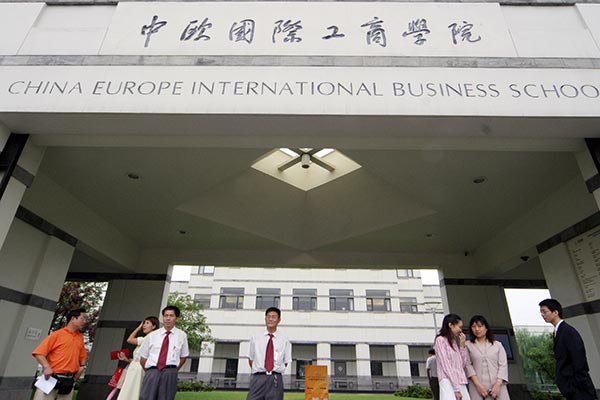 |
|
People at the entrance of the China Europe International Business School. HE ZI / FOR CHINA DAILY |
His decision stands in spite of the fact that all candidates will need to take the stricter nationwide common entrance test to get admitted into an EMBA program starting 2017. In the past, business schools were free to administer their own tests to applicants.
The common entrance test is not Hu's major concern though. What bothers him instead is the prospect that he may end up sitting in the classroom discussing projects with much younger students whose work experience may be different from his own.
But he believes many like-minded businessmen prefer EMBA courses so they could share thoughts in the classrooms and learn from each other.
Hu plans to apply for the EMBA course at the Shanghai branch of the Cheung Kong Graduate School of Business later this year.
But it is still not clear if the new system would allow him to pick the school and program of his choice. In other countries, performance in the common entrance test usually determines the school and the program for a student.
"The new system will probably prevent the richest from seeking EMBA programs merely to extend their social networks. But it may help experienced businessmen learn modern management skills from such courses," said Hu.
He was referring to the fact that a regular or full-time MBA spanning two-and-a-half years entails a cost of about 100,000 yuan ($15,360) for a student, but a two-year part-time EMBA costs five times that or 500,000 yuan.
The existing EMBA programs thus came to be seen as designed for the rich and the highly placed (including government officials and senior executives of State-owned enterprises), sometimes leading to a mad scramble among revenue-minded schools to tap this segment.
Such a competitive approach is believed to have led to sienior executives of State-owned enterprises), sometimes leading to a mad scramble among revenue-minded schools to tap this segment.
Such a competitive approach is believed to have led to situations where the quality of entrance tests and programs was compromised, and EMBA degrees were doled out rather easily.
"I won't give up on my pursuit of an EMBA. I'm not afraid of taking the common entrance exam, which seems to be a more fair way to evaluate my academic ability. But I don't think it'll become the only method to evaluate whether the applicant is qualified or not," said Hu.
Since their introduction in 2002, part-time EMBA programs sought to meet the educational needs of managers and executives who needed to continue working full time.
"EMBA students typically have a higher level of work experience, often 10 years or more, compared with regular MBA students. EMBA students' average age tends to be 40. They almost always share a common goal: to make as many friends as they can during the two years," said 42-year-old Shen Jia, who received his EMBA from China Europe International Business School in 2005.
"When I was at the school, I tried to learn more about practical management of my business (a computer training institute in Wenzhou, Zhejiang province) from the course and from classmates. But I didn't learn as much as I had expected," said Shen.
Shen said far too many EMBA courses have been offered by business schools over the past decade, creating doubts in his mind if the society really needed so many business managers.
The new regulation, Shen said, could help restrict the number of EMBA applicants, and prevent institutions from designing and offering courses merely to earn revenue.
However, Kathy Fu, founder of a knitting brand in Shanghai, disagrees. She said she learnt more than she had expected from her 2009-11 EMBA course at China Europe International Business School.
Fu fears any excessive emphasis on academic aspects in the new common entrance test, could dash the hopes of some experienced businessmen, who may be genuinely seeking to improve their skills and abilities.
"While the new system may help rein in money-minded EMBA institutions, bona fide universities may lose out on excellent applicants merely for want of high scores in Chinese, mathematics and English," said Fu.
She cited her own experience as an example. A decade ago, she moved from Xiamen, Fujian province, where she was the principal of the local branch of EF Education First, to Shanghai, to launch her own knitting brand. Fu lacked the management skills required to run a company. So, she enrolled in an EMBA course.
"I've been quite lucky to take up the course with a group of experienced entrepreneurs. We were taught by professional teachers who broadened my view of the business world and helped me to become a more confident and well-organized business-owner," said Fu.
